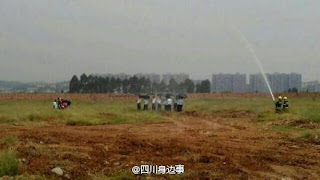Though the wind was blowing hard, the sea was peace and waves were calm. Gang happily found wind turbines along the route. I almost couldn't hold my hat but I couldn't stay away from the beauty in front of me. People were fishing around us, with professional equipment and entertainment facilities. Gang and I sat by them, eating the two apples we brought. We both found it very pleasant to eat apples by the sea, which soon became a must in the rest of our journey: we look for beaches all around only to eat apples.
About two hours later, we left the South Point before the sun got too strong. It was still hot, but the sea wind cooled us down. The Volcanoes Park was well preserved: there was only a small visitor center with a big parking lot, no commercial facilities to ruin the park. Rangers there explained to us how the Big Island was created by volcanoes, and some big eruptions in history. He mentioned that in 1970s, a volcanic eruption was predicted and lava was believed to head for Hilo, a small city in east Big Island. But residents in Hilo was told by the government that the lava wouldn't reach the city, therefore they shouldn't worry about it. That night, people in Hilo anxiously looked at the volcano. They got panic when they saw flames lighting up the sky and red lava moving slowly but steadily towards them, some even started packing. Luckily the lava stopped four miles away from Hilo, and no one was hurt. In spite of this, some people still lost their properties in the eruption. He mentioned a guy who opened a B&B by the volcano. This hotel keeper escaped in his helicopter, but his house was melted in lava forever. At the end of his introduction, he asked: "So be honest, how many of you will go back and tell your friends and relatives that you actually saw red lava here?" Audience laughed and some did raise their hands. The ranger smiled and took out a small card with "LAVA" printed in red on it, "Now you all see red lava!"
 There are several trails by the visitor center, but we decided to skip them because of my poor eyesight. Gang drove to the museum directly, by which there is a big smoggy crater, one of the culprits for the expanding island. We couldn't get closer to the crater for safety concerns, but it was astonishing enough to see such big flows of steams and smoke rising to the sky. Later we saw similar but much smaller natural hot wells in the park. I stood by one of them for a while, and OMG it was hot.
There are several trails by the visitor center, but we decided to skip them because of my poor eyesight. Gang drove to the museum directly, by which there is a big smoggy crater, one of the culprits for the expanding island. We couldn't get closer to the crater for safety concerns, but it was astonishing enough to see such big flows of steams and smoke rising to the sky. Later we saw similar but much smaller natural hot wells in the park. I stood by one of them for a while, and OMG it was hot.This is absolutely the most impressive crater "lake" I've ever seen. The crater lake in Oregon is splendid for sure, but what makes this one different is that it's filled with lava, not water. Red lava filled the crater but failed to find an outlet. It finally cooled down and became a rocky lake. Some brave travelers took the trail across the lake (the white lane in the middle of the lake), and I'm sure it will be a really impressive experience to walk on the black but still burning lava for hours.
Gang's favorite place is this lava tube, which transmits red lava like a pipeline after eruption. The tube is dark and wet, whose entrance is covered by many tropical plants. I walked very carefully in the tube. The wall is so cold and hard that it's hard to imagine that red lava has been running in it.
The Big Island is young and active. When human beings try to build their cities on this island, the nature always finds its own way of reshaping it. During our trip in the Volcanoes Park, we found several signs along the road indicating in which years the lava was formed, just like an alumni reunion with each camp hosting students from a certain year. The end of road was stopped by the latest eruption, whose lava covered the pavement and stopped our car from going any farther. It is amazing to think of the fact that the land that I was currently standing on was still alive, laughing at people's futile efforts to change the nature, actively creating new lands and expanding to the sea. We didn't stay in the Park for too long as most visitors who stay late to see red lava at night. But everything I saw here is unprecedented.






















